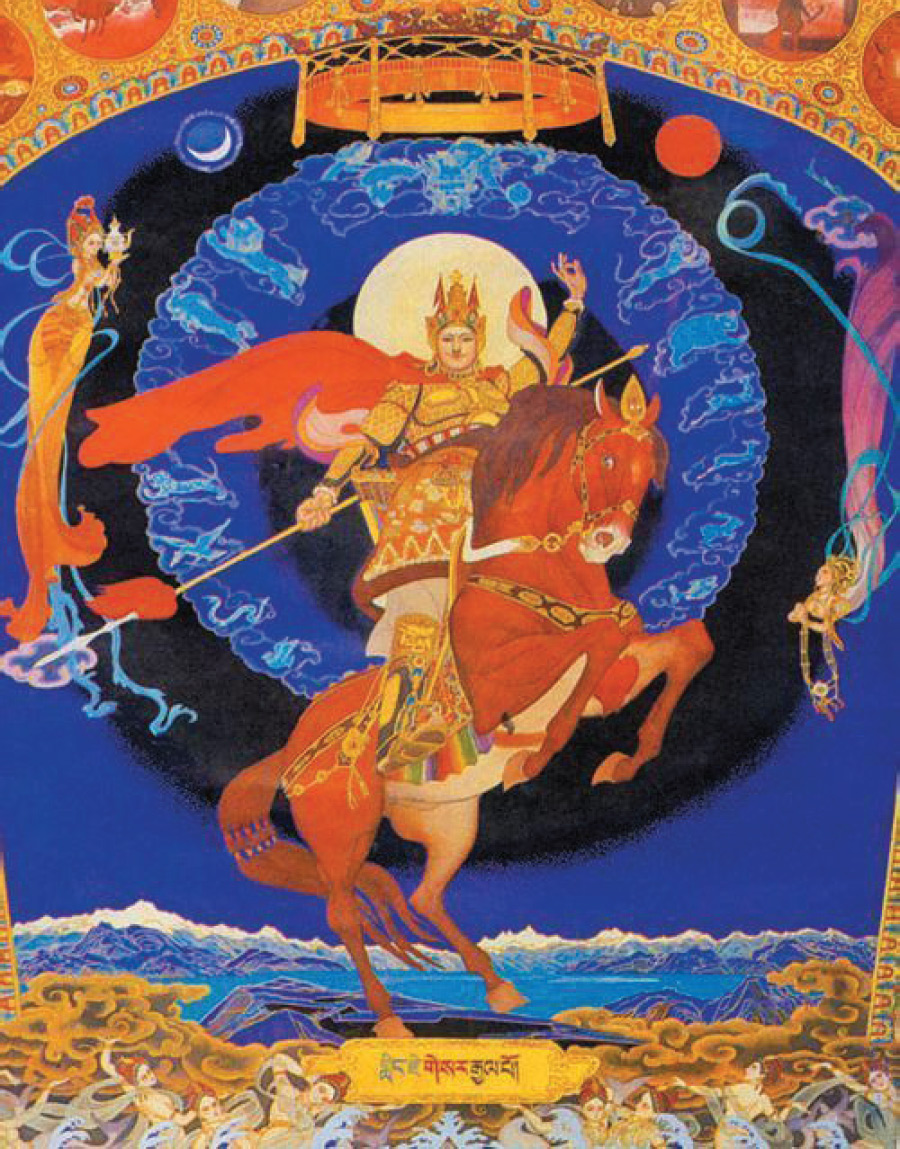
Stories of King Gesar of Ling make up the greatest epic to come out of the Himalayan Kingdom of Tibet and its surrounding countries. King Gesar manifested as a divine king 800 years ago, brought into the world by the great Guru Rinpoche PADMASAMBHAVA to subdue the demon kings to bring peace to the world, marching alongside Spiritual Warrior Generals, and in the process becoming a legend in Asia. In the future, King Gesar has been predicted to take birth once again (in 2424 actually) to become the last King of Shambhala Rudrachakrin, and that is when he will fight against the forces of evil one more time to bring about a thousand years of peace.
King Gesar’s many wars were never expressions of anger, greed or revenge. Always, they were to bring victory of right over wrong, peace over hostility, joy over suffering and freedom over suppression.
The Ling warriors fought many wars to eliminate suffering so that people could live their lives in peace. And so the legends of the exploits of Gesar’s heroes were created.
But war is always ugly, and the lives of all affected are unbelievably sad. Those who live on survive to remember their loss. King Gesar the great lion king was no different. As a human king, Gesar was subject to the same human frailties and temptations as any of his people, and King Gesar’s great epics tell of the many tests and tragedies endured by this great warrior king.
And it is when the fighting is done and he contemplates the terrible costs of war that King Gesar sings his songs of realizations and epiphanies. King Gesar’s private thoughts are incredibly beautiful and deep in meaning. They make you think, and so here I want share three such songs, which have been brilliantly translated into English by Douglas Penick in his lovely book THE WARRIOR SONG OF KING GESAR.
The first is his speech when he becomes King of Ling having won the HORSE RACE on his magical horse, which we now know as the great WINDHORSE who strengthens our lung ta and brings success always. Meditate on the words of King Gesar and feel a joy arise within you, for we can all think of him as the wisdom protector who now watches over us as a Spiritual Enlightened Being.
So:
Noble lords and ladies, brave warriors
Know me as I am, the one who has been foretold,
It has been written in prophecies
and you know it in your hearts,
I am Gesar, King of Ling,
Who brings prosperity dignity and joy,
Who destroys cowardice delusion and alvery,
I am Gesar Lion King of Ling,
The great conqueror and leader,
I am the light of your darkness,
The food of your hunger,
The scourge of your corruption
I hold the sword of truth in one hand
and the medicine of peace in the other,
The time of my kingdom is now.
Second is the declaration of love for the woman whose hand in marriage he has won; beautiful Sechan Dugmo, the most beautiful lady in the land… the start of their love story:
I take this proud disdainful lady as my wife
I take Sechan Dugmo as a jewel into my heart,
When I look at her, I know that joy is
truly without limit.
She is bliss itself and the banner of victory,
She is the wellbeing of our kingdom,
My life is in her gentle hands
She is the golden Garuda
Whose plumage outshines all others,
Who will sing her melodious song
Nesting in the tree of my life.
Third is this soulful song many years later, when their life together has been shattered by war, black magic and betrayal of unimaginable kind. For King Gesar leaves his wife behind to subdue a neighboring Kingdom, only to fall under the black magic spell of that nation’s black Queen. In his absence, the Kingdom of Ling is invaded by the King of Hor, who captures the lovely Sechan Dungo and takes her away to be his new Queen. Of course, King Gesar eventually returns to defeat the King of Hor and brings back his wife, but not before she has given birth to a son to the King of Hor.
Ah the sadness and tragedy of war…
When the warriors of Ling defeat the King of Hor, the warriors are overjoyed at their victory. They set out a great feast, and dancers perform their song and dance. Sechan Dugmo, alone in her tent and still wearing the clothes of the queen of Hor is by turn bitter, ashamed, grief-stricken and afraid to show herself to the people of Ling. Gesar comes to visit her in her tent, but she cannot bear to look at him and she hides in the shadows. Standing in the tent wearing his splendid armour, Gesar addresses her softly:
Sechan Dugmo, Queen and wife,
remorse at what each of us has done
Anger at what each of us has seen the other do,
Sorrow that true love has proved so fragile.
Sadness that passing love has been compelling
and disastrous,
Doubt that even genuine love can be restored,
Fear that neither decency nor joy have a place
In such deceitful and dangerous terrain.
All these things, O dear companion of my heart
Seem to separate us so, and yet,
We share them utterly.
With that Gesar walks quietly from the tent.























